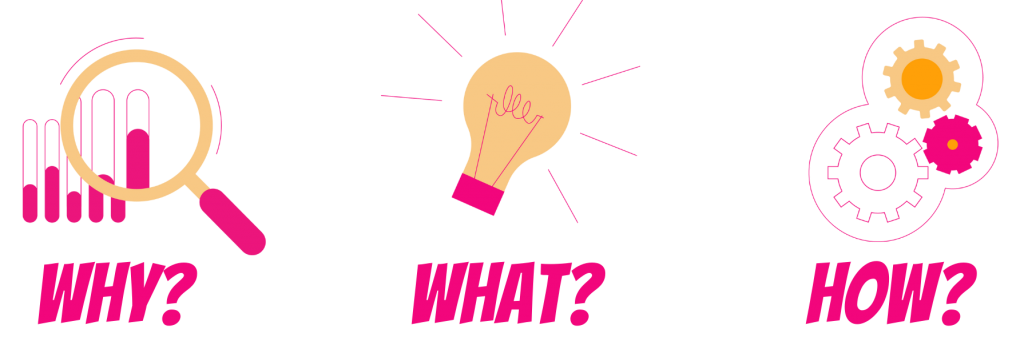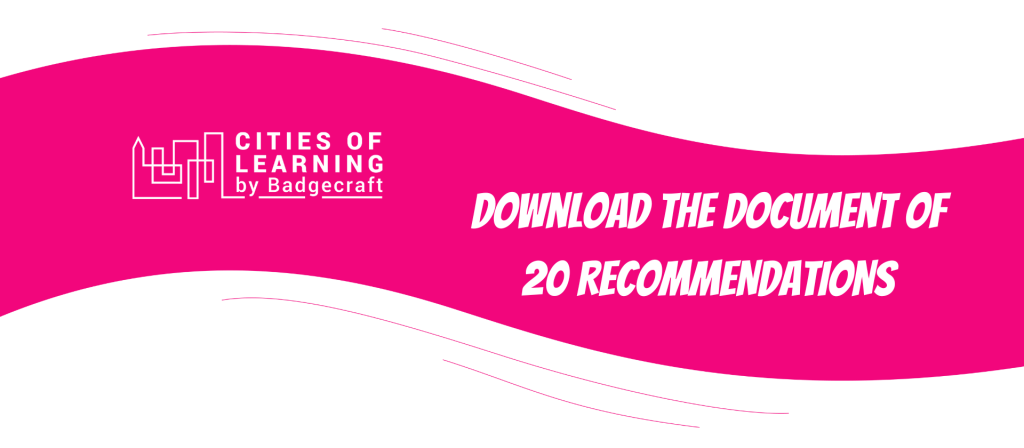20 recommendations for the futures of Non-Formal Learning, Sustainability, Inclusion, Participation and Mental Health

If your organisation is ready to support these recommendations, please express your endorsement to Nectarus: info@nectarus.lt. After receiving it, we will add your organisation’s name to the supporters’ list at the end of these recommendations.
Over the last two years, young people, local stakeholders and Cities of Learning partners engaged more than 600 young people in consultations about learning, civic and career pathways. From here, we empowered 40 young people to take part in our Youth Seminar in Lorca (Spain) in April 2022 to build on the outcomes of the consultations.
Finally, more than 100 young people, youth workers, educators, policy and decision-makers came together at the Cities of Learning Youth Forum in Magdeburg (Germany) in July 2022 collaborating to create and confirm these recommendations. Their aim was to respond to some specific challenges across five priority topics which were:
- Non-Formal Learning – increasing numbers of young people are dropping out of traditional education pathways, with many choosing non-formal learning environments which lack recognition instead.
- Sustainability – the challenges posed by climate change in Europe and globally and the calls for action and responsibility from young people.
- Inclusion – some young people have fewer opportunities to learn, create careers and engage with society, as a result of issues such as poverty, poor standards of education etc.
- Participation – falling trust in democratic institutions and processes, and the need for new forms of participation.
- Mental Health – advances in technology and the global pandemic have had an impact on people’s mental health.
Collectively, participants both young and older, created 20 recommendations that we believe are vital and must be addressed in the next 10 years. Now, the Cities of Learning partners will champion them and work towards creating a better future for all, but we cannot do it alone. We need the support of policy and decision-makers across Europe and beyond to make these recommendations a reality.
We call on stakeholders at all levels of education, businesses, NGOs and governments at local, regional, national and European levels, to implement them as quickly as possible.
Watch Cities of Learning young people’s and partners’ pledge:
Biliana Sirakova, EU youth coordinator, sending a video message to Cities of Learning Youth Forum participants:
THE RECOMMENDATIONS
These recommendations are numbered for the purpose of reference only and not because of anyone being more important than another. We believe all our recommendations are equally important and some should even be viewed collectively.
Non-Formal Learning
These recommendations should be viewed holistically.
A.1 School should have at least one day of non-formal learning every month, delivered by professionals, young people or other individuals with experience in the field.
A.2 Stakeholders in formal education settings (including senior leaders, teachers, lecturers, parents, volunteers and others) should be better informed of the benefits of non-formal learning and should be connected with role models and professionals in the field.
A.3 Support and ensure more research is carried out on the impact, benefits and purpose of non-formal learning so they can be explained to stakeholders (including employers, parents, teachers, volunteers, lecturers and others) in order to promote it.
A.4 Local governments should facilitate and provide the resources for collaboration between NGOs, schools and other partners, creating a stronger and more holistic network where countries are able to work from the same baseline.
Sustainability
*DEMANDS NOT RECOMMENDATIONS
B.1 Ensure people are better informed about the benefits of sustainable lifestyles, empowering them to be advocates, custodians and campaigners for the planet.
B.2 Businesses must be required to publish accurate, standardised data about pollution they produce in an accessible format and this process must be regulated independently. People should be empowered to put pressure on them based on the data.
B.3 Ensure young people are better informed on the issues so they can have an active role in shaping decisions about issues that affect their futures. This should include topics such as; circular economy, public awareness, extraction of resources, consumer practices and transport.
B.4 Governments should immediately take action on practical and solvable things including implementing policies and practice such as:
- Hydroponic agriculture
- Sustainable fishing
- Reuse-and-Rebuild approaches
- Allocating transportation funds to clean public transport only
- Divert funds away from big business and into smaller local and sustainable projects and businesses
Inclusion
C.1 Create more specific opportunities for participation of excluded young people (inclusive events, activities, language learning for inclusion, increased mobility to gain essential life experiences).
C.2 Local and regional governments should provide the resources to enable safe spaces, projects and activities for community cohesion and cultural exchanges that are available, relevant and engaging for their communities.
C.3 Formal education settings should actively facilitate a safe place to discuss LGBTQIA+ topics, including providing staff with appropriate training that allows young people the freedom to express themselves.
C.4 Create accessible and inclusive spaces and events accessible for all young people with disabilities by providing access support such as Personal Assistants, suitable physical infrastructure, sign language interpreters and Braille.
C.5 Governments should immediately provide the resources to enable specific opportunities for the integration of young refugees and immigrants to ensure they feel part of the community.
Participation
These recommendations should be viewed holistically.
D.1 Considering and acting on young people’s opinions and interests must be a legal requirement for governments at local, regional, national and international levels. There must also be a mechanism to challenge decisions with clear timeframes and processes.
D.2 Campaigns and involvement opportunities should be designed to be engaging and appealing to young people, reaching them through the channels and locations they use and should promote political engagement.
D.3 Governments should ensure advisory youth councils and parliaments are established at local, national and international levels and provide a meaningful and impactful, creative and age appropriate democratic opportunity.
D.4 Governments at local, national and international levels should secure sustainable funding to ensure young people have the opportunity for participation projects and being part of a youth council or parliament.
Mental Health
E.1 The government should provide funds for schools to integrate the mental health and healthy lifestyle practices in formal education by developing:
- a subject “health education” that includes mental health, non-competitive physical activities, practice of healthy lifestyle and nutrition, and specialist training for teachers so they can deliver it;
- a standardised mental health framework that institutions can use when writing new, or reviewing existing policies and procedures;
- educating mental health mentors (peer to peer) and school staff on the topics.
E.2 The government should develop proper recourse mechanisms for free mental health services including:
- Educating and preparing mental health mentors in communities in addition to psychologists and medical professionals;
- Easy access to mental health helplines, professionals and services;
- Regular health checks at schools provided by psychologists and the chance for students to take part in training to become health mentors;
- Providing existing publications for children and adults covering the topics (cartoons, books).
E.3 The government should recognise the importance of mental health and its visibility. They should do this by:
- National campaigns to increase public awareness of mental health including press and media activity, dedicated events (such as World Mental Health Day) and other communication methods;
- Increase staffing and capacity by making study and employment in the mental health field accessible and attractive.
- Ensuring the recognition of mental health related qualifications and providing opportunities to pursue them.
If your organisation is ready to support these recommendations, please express your endorsement to Nectarus: info@nectarus.lt. After receving it, we will add your organisation’s name to the supporters list at the end of these recommendations.
These recommendations are endorsed by the following organisations:
- Badgecraft (Ireland), which leads development of a Global platform for Cities and Regions of Learning
- BalkanIDEA (Serbia), which leads Novi Sad City of Learning
- Bildungsnetzwerk Magdeburg gGmbH (Germany), which leads Saxony-Anhalt Region of Learning
- Breakthrough (The Netherlands), which leads Breda City of Learning, Rotterdam City of Learning and Tilburg City of Learning
- Cazalla Intercultural (Spain), which leads Lorca City of Learning
- Creativitas (Lithuania), which implements communication activities for Cities of Learning initiatives
- Nectarus (Lithuania), which leads Vilnius City of Learning
- NUR (Italy), which leads Cagliari Metropolitan City of Learning
- TiPovej! (Slovenia), which leads Ljubljana City of Learning
- Vestfold og Telemark fylkeskommune (Norway), which leads Vestfold og Telemark Region of Learning
- IRDO – Institute for the Development of Social Responsibility (Slovenia) which is a member of CRS Europe – the leading European business network for Corporate Sustainability and Responsibility.
- Institute for Youth Policy, Ajdovščina (Slovenia)
“Challenge Accepted – Europe” participants contributed to and support these recommendations.



